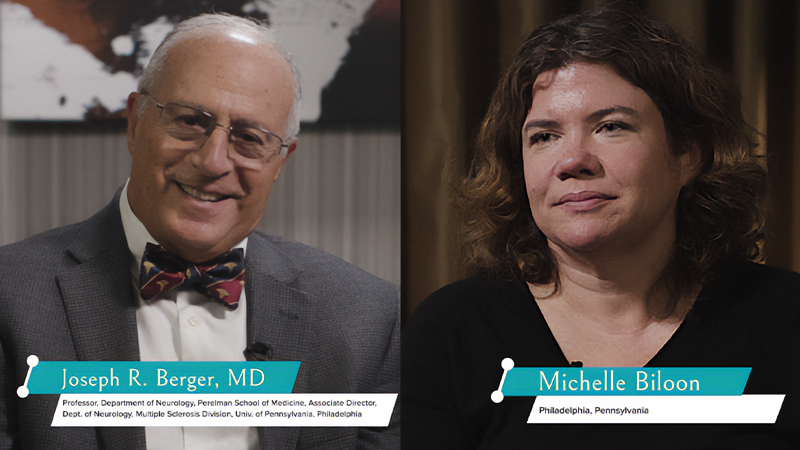This transcript has been edited for clarity.
Joseph R. Berger, MD: Hi. I'm Dr Joseph Berger, and I'm joined for this Care Cues conversation with my patient, Michelle Biloon, who has had multiple sclerosis (MS) for the past 6 years. Hello, Michelle. Welcome.
Michelle Biloon: Thank you, Dr Berger.
Berger: Can you tell us a little bit about yourself, how you came to understand you had MS, and how you've done since the diagnosis was rendered?
Biloon: Yeah. It was a very short diagnosis period for me. In the winter of 2017, I started experiencing dizzy spells, and I didn't really know why. I eventually went to my primary care clinic where my doctor is, and they did blood work. Then, they did a CT and didn't see anything, and I just kind of kept feeling worse.
Then, finally, I went to an ENT just to see if it was maybe related to my ears. The ENT actually said, "You need to go to the ER and get an MRI." And while I was in the MRI, I could feel the dizzy spells. And I thought, Well, something is happening. I don't know what it is. And then a resident came in and said that they saw lesions on my brain, and they knew that it was going to be MS or something like it.
Berger: How did you feel about that?
Biloon: At the time, I was kind of glad to hear it was something. And I just asked her if, like, you die from it. That was the first thing I asked. It was like falling off a cliff.
It was making it hard for me to function in what I was doing, which was stand-up comedy, because of the cognitive issues I was having, the cognitive fog. That was how I ended up with you. Right away, you talked to me and were actually able to introduce to me some new medications that are out and are phenomenally better for MS plus were not pills or shots every day. It's made my MS over the years a lot more manageable.
Berger: I'd like to pick up on a couple of things you said.
Biloon: Sure.
Berger: One is, because most people envision MS as this terrible, crippling illness that's going to leave them wheelchair-bound, deprived of their profession, finding it difficult to stay in a marriage it's vested with what has been termed "lamentable results." And one of the first things that we as physicians have to do is to calm people down and say, "You know what. You have MS. You're going to be just fine. Trust me. We have wonderful medications for what you have, and we'll take care of it." In fact, I've made a habit of telling people quit worrying. You hired me to worry for you.
Biloon: Yep.
Berger: And I think that's helpful.
Biloon: I've been just so appreciative of that. There's a balance of being condescended to — do you know what I mean — and also being given information. I'm very sensitive to that balance because I consider myself an intelligent person. And you're being put in a position where someone knows more than you, and you have to listen.


